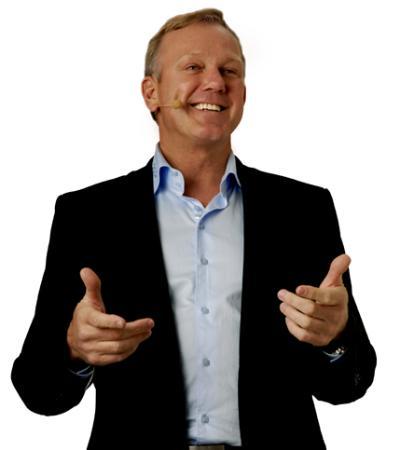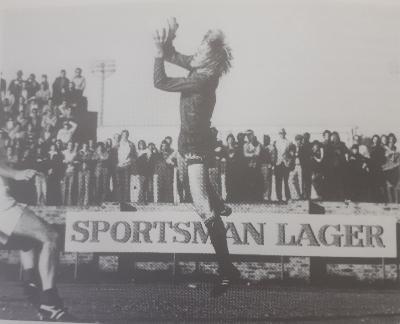Those were the best years of my life
- Ufrieda Ho
Football legend Gary Bailey looks back at where it all started – on the pitch at Wits.
The thing about chances is what you do with them. For international football legend Gary Bailey this came down to a football scholarship to Wits in 1976 and the 10 matches he got to prove his worth.
“I was this gangly 17-year-old and those first couple of games didn’t go well and quite a few goals got past us – there were rumblings in the dressing room. But Ronnie Schloss gave me those 10 games and by the tenth game I had settled and was playing really well. I never looked back,” says Gary.
Wits would end up near the top of the table in the two years the civil engineering student was their goalie. And in 1977 he was named Wits Sportsman of the Year.
Gary speaks from Miami, Florida where he has lived for 10 years with his wife, former Miss Universe Michelle McLean and their blended family.
His point about chances is that it’s not just seizing opportunities but acknowledging that there is a contract of trust and a commitment in effort. And when these elements slot in - like they did for him at Wits - then magic happens.
In 1977 Gary had already made the national side; he was just 18 years old. With a football player dad, Roy Bailey, the decision was easy that he should spread his wings and try out for the European teams. He headed to the UK where he was born and spend the first six years of his life. Manchester United took a chance on him too, instantly transforming his career path.
Gary, now 65, says it wasn’t all plain-sailing in the early days at Old Trafford. There were unlikely hurdles, like adapting to a different way of life that included coping with the notoriously bad weather UK weather; sharing digs with three other guys and being away from home, and having little to do other than two hours of training a day.
“I love being busy, doing something, so sitting around after training and just window shopping (because I didn’t have any money) for the rest of the day really messed with my head. Not to mention, South Africans have no idea just how miserable the UK weather can be,” he says.
But he stayed. In his 10 years with the Red Devils – “the greatest football team in the world” – he played 375 first team games for the club and helped them lift the FA Cup trophies in 1983 and 1985.
When he came back to South African in 1987 the intention, he says, was to “retire from football and get back into society”. It was also time to nurse his “wonky knee” so he enrolled at University of Cape Town to do computer science and managed to pass second year exams by catching up on 18 months of lessons in six months. The following year though he was back in Joburg and back at Wits, enrolled to do third-year computer science. He came out of retirement to take up a contract playing for Kaizer Chiefs. He retired (properly) from the game with the “Glamour Boys”, with a highlight of helping Chiefs win the league in 1989.
For Gary the next phase of life was sports presenting on radio, but he also returned to his studies. He earned a BSc in physics through Manchester Polytechnic and later an MBA from Henley Business School in Oxford.
By the early 1990s South Africa was roiling with the agitated but determined birth of democracy. “I knew I had to stay and when South Africa hosted the 1996 Rugby World Cup it was my proudest moment of being a South Africa. There were so many things to worry about but it went off without a hitch and we showcased the true beauty of South Africa.”
Gary’s sport presenting on radio and then TV, including his own chat show, made him even more recognisable to South Africans and in 2010 when the World Cup came to South Africa he was an obvious ambassador.
It was also the year he met Michelle. Three years later they were married and made their move to America. He now works as a speaker and commentates for the National Women’s Soccer League. Commentating was another skill he had to learn, another chance he had to make good on.
At heart, Gary is a problem solver and someone who has made adapting to thrive his mind set. He brought out a book on turning football’s lessons into business success and also on helping fathers cope with divorce.
“I’ve tried many different things over the past 40-odd years because I believe you have to find new skills after playing football. It has meant sometimes things have been challenging, but they’ve also been interesting,” says Gary.
Gary and Michelle split their time between America and time in South Africa and Namibia. They work to help create enabled environments for sports development, philanthropy, social enterprise and business. 
Gary knows the power of making opportunity count; also creating the right seedbeds to nurture excellence. He says: “I still say those years at Wits were the best of my life. There are the great memories, he says, like being part of the EOH (Ernest Oppenheimer Hall) family, or the day he just managing to get his 50cc scooter up Jan Smuts Avenue. The same bike that failed to impress some dates, he recalls, with a chuckle. And there the moments to pause, between late classes and practice, when he’d head to the Wits pool and watch the water ripple as the afternoon sun set.
But Wits was in essence about owning his full potential. He says: “When I left school I was a nobody; in school my sporting prowess was not appreciated and I also never bothered studying until my final matric exam. But at Wits I started to blossom on the pitch and academically. I finished top 10 out of 400 civil engineering students in my first year,” he says.
Gary’s “wonky knee” means these days even a backyard match with his grandkids is off limits for the leaping and diving style of the goalie. But his passion for the game hasn’t faded. It’s the beautiful game after all, and it’s the one that changed his life.


